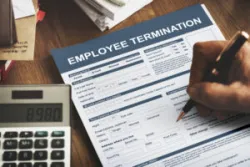
Ending employment in Massachusetts can be a challenging experience for both employers and employees. It’s important to be aware of Massachusetts employment termination laws to protect your rights and act within the legal framework.
If you’re an employer, understanding these laws is key to maintaining fair practices. It’s important to work with a law firm that is committed to holding employers and corporations accountable for any unlawful termination practices.
When questions arise, you can rely on a Boston labor and employment lawyer to provide clear guidance and support throughout the process.
Understanding At-Will Employment in Massachusetts
In Massachusetts, most employees work under “at-will” conditions. This allows employers to end employment at any time without providing a reason. However, there are important exceptions to this rule under Massachusetts labor and employment law.
At-will employment isn’t solely in the employer’s favor. It also gives employees the flexibility to leave their job whenever they choose, without needing to offer an explanation.
If you feel you’ve been wrongfully terminated, a lawyer is available to offer the support and guidance you may need.
For a free legal consultation, call (860) 999-9394
Understanding Wrongful Termination
In Massachusetts, most jobs follow “at-will” employment, allowing employers to dismiss employees at any time unless a contract specifies otherwise.
However, there are exceptions where termination can be unlawful. Employers may violate state or federal laws if these exceptions apply:
- Discrimination against protected classes (e.g., race, religion, gender, sexual orientation, age, disability, pregnancy).
- Retaliation for whistleblowing or reporting illegal activities.
- Retaliation for refusing illegal tasks or for exercising rights under laws like the Family and Medical Leave Act (FMLA).
Knowing these exceptions is essential for protecting your rights. If you suspect wrongful termination, understanding your options and seeking advice from a Boston employment discrimination lawyer can help you pursue fairness and justice in your workplace.
Importance of Performance Reviews and Warnings
Though employers aren’t usually required by law to give warnings before termination, keeping a record of performance reviews and warnings can be helpful. These records can provide valuable documentation if any concerns about wrongful termination come up.
Many employers include performance reviews and warnings in their internal practices, but these are generally not legally binding unless outlined in an employment contract. Having clear documentation can contribute to a fair and transparent workplace.
Click to contact our labor & employment lawyers today
Identifying Employment Discrimination
While employers can end employment for many reasons, discrimination is not one of them. Both federal and state laws protect employees from being terminated based on certain characteristics like race, gender, or disability. If someone in a protected class is let go without a valid reason, it could be seen as discriminatory.
It’s important to note that terminating an underperforming employee, even if they belong to a protected class, isn’t automatically illegal. However, you should be ready to provide and document a legitimate, non-discriminatory reason for the decision.
If you’re thinking about disciplining or terminating an employee in a protected class, seeking legal advice beforehand can help guide your actions and reduce potential risks.
Complete a Free Case Evaluation form now
Handling Retaliation Concerns
Employers cannot take adverse action against employees who engage in legally protected activities. This includes reporting discrimination, filing wage complaints, taking family leave, or complying with legal duties like jury service.
While it’s legal to terminate an underperforming employee, you must have a clear, legitimate reason that isn’t linked to retaliation. Proper documentation of your decision is important.
Before taking action, consulting with legal counsel can help you make informed decisions and avoid potential legal issues.
Unemployment and Termination
Employers frequently ask about contesting unemployment claims after terminating an employee “for cause.” It’s important to note two things. First, termination for cause doesn’t always disqualify someone from receiving unemployment benefits unless it involves willful misconduct or a clear policy breach.
Second, challenging unemployment benefits could lead the terminated employee to pursue other legal actions related to their dismissal. This may mean the risks outweigh the potential benefits to your organization.
Given these considerations, it’s a good idea to consult with an employment attorney to weigh your options and decide on the best course of action.
Important Employer Responsibilities at Termination
When ending employment in Massachusetts, employers have certain obligations. These include paying final wages, settling unused vacation time, and offering guidance on unemployment benefits. Severance agreements may also be provided, and it’s important to understand them fully.
Missing the deadline for final payments can have serious consequences, including significant financial penalties. Even a single day late can result in liability for triple the amount owed, putting your business at risk.
Handling these responsibilities promptly and correctly not only avoids penalties but also helps maintain a fair and lawful termination process, fostering trust and transparency in the workplace.
Time Limits for Wrongful Termination Claims
If you believe you’ve been wrongfully terminated, it’s important to act quickly.
In Massachusetts, both the MCAD (Massachusetts Commission Against Discrimination) and the EEOC (Equal Employment Opportunity Commission) require claims to be filed within 300 days of your termination date. If the MCAD can’t resolve your claim, they will issue a “right to sue” letter, giving you 30 days to file a civil lawsuit.
Similarly, if you filed with the EEOC, they might issue a right to sue letter, granting you 90 days to start legal action. To protect your rights, consider reaching out to an experienced employment law attorney who can guide you through this process.
Protecting Your Rights in Massachusetts
If you believe you’ve been wrongfully terminated, understanding Massachusetts employment termination laws is essential for safeguarding your rights. Acting promptly can significantly impact the outcome of your case.
Duddy, Goodwin & Pollard are here to stand by your side, holding employers and corporations accountable for their actions. Their experienced team is ready to guide you through every step of the process.
You deserve to have your voice heard and your rights protected. Reach out to Duddy, Goodwin & Pollard for compassionate support and strong representation.
Call or text (860) 999-9394 or complete a Free Case Evaluation form


